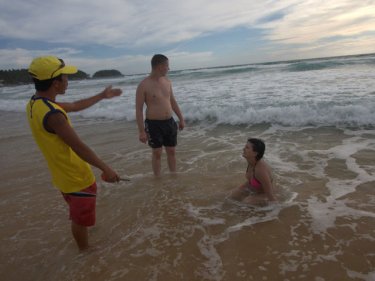RESORTS on Phuket's popular west coast are to be asked to cooperate to help save tourists and residents from drowning this ''summer'' season.
Education is seen as vital - many people on the island do not understand the life and death issue. All tourists may soon be informed of the dangers, through their resorts, in at least six languages.
Lifesaving chief Prathayut ''Nut'' Cheryon met yesterday with Phuket Provincial Administrative Organisation president Paiboon Upatising to plan a campaign to involve all resorts.
Phuket has a lifeguard system in place after five months with unprotected beaches, but it is not the whole answer.
Latest figures show that five people drowned in and around Phuket in April - a high number when compared with the 10 deaths on the roads in the same month.
The same kind of awareness to potential danger is needed in the water as in negotiating traffic, says Khun Nut, whose contract to supply lifeguards at the island's most popular beaches has been in operation since April 26.
''We are happy to go to every school on the island to help teach and train the children,'' he said. Improvements are being made to lift Phuket lifeguard standards to match those of Australia and California.
Many of the deaths recorded on Phuket during the last ''summer'' period from April to October were overseas visitors who had been enticed to come to Phuket for beach holidays without being told of the seasonal risk posed by deadly underwater currents, known as rips.
Another high-risk group is among Thai children who are not taught to swim as a matter of self-protection, they way that children are in some other countries.
The new Phuket lifeguard group is expected to maintain and protect designated safe swimming areas on all beaches. But difficulties arise in explaining to tourists who do not speak Thai or English that, in the wrong conditions, they are risking their life by going for a swim.
Education is seen as vital - many people on the island do not understand the life and death issue. All tourists may soon be informed of the dangers, through their resorts, in at least six languages.
Lifesaving chief Prathayut ''Nut'' Cheryon met yesterday with Phuket Provincial Administrative Organisation president Paiboon Upatising to plan a campaign to involve all resorts.
Phuket has a lifeguard system in place after five months with unprotected beaches, but it is not the whole answer.
Latest figures show that five people drowned in and around Phuket in April - a high number when compared with the 10 deaths on the roads in the same month.
The same kind of awareness to potential danger is needed in the water as in negotiating traffic, says Khun Nut, whose contract to supply lifeguards at the island's most popular beaches has been in operation since April 26.
''We are happy to go to every school on the island to help teach and train the children,'' he said. Improvements are being made to lift Phuket lifeguard standards to match those of Australia and California.
Many of the deaths recorded on Phuket during the last ''summer'' period from April to October were overseas visitors who had been enticed to come to Phuket for beach holidays without being told of the seasonal risk posed by deadly underwater currents, known as rips.
Another high-risk group is among Thai children who are not taught to swim as a matter of self-protection, they way that children are in some other countries.
The new Phuket lifeguard group is expected to maintain and protect designated safe swimming areas on all beaches. But difficulties arise in explaining to tourists who do not speak Thai or English that, in the wrong conditions, they are risking their life by going for a swim.




